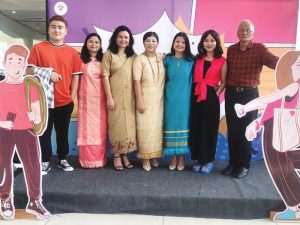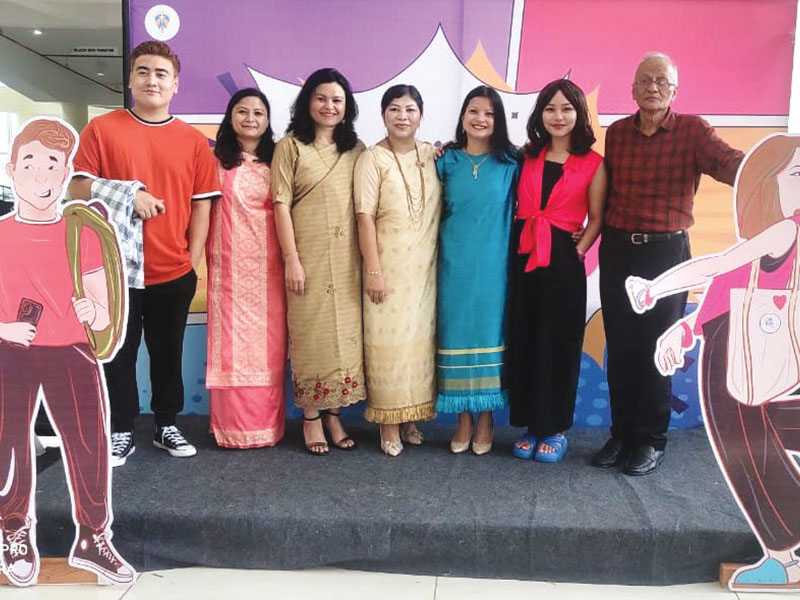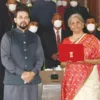21 Higher education leaders racing to develop india’s high-potential human resource: Dr. Glenn Kharkongor
Dr. Glenn Kharkongor
Chancellor, Martin Luther Christian University, Shillong

A medicine and public health alum of Christian Medical College, Vellore and Loma Linda University (USA) with over four decades of experience in academics, administration, policy research, and public service, Glenn C. Kharkongor is Chancellor of Martin Luther Christian University (MLCU), Shillong.
What are the major objectives set for MLCU until India’s 100th Freedom Anniversary in 2047?
In 2047, MLCU will have completed four decades as Northeast India’s first private university. We would have settled into our new campus on the pine tree slopes of the Khasi Hills. I am confident that MLCU will become the university of choice for aspiring youth of Northeast India, and for national and international students seeking an educational culture that values student diversity, biodiversity, and social enterprise.
By 2047, MLCU will demonstrate and lead a model of higher education that is dynamic, relevant and entrepreneurial for every generation of learners.
How satisfied are you with your progress thus far?
In its short journey, MLCU has proven itself to be a new-gen university. We are located in a region that has been largely bypassed by the economic growth of mainland India, and where entrepreneurship has not been valued or incentivised. But we are determined to remain true to our purpose of motivating youth to build local enterprises rather than migrate for job-seeking. Many of our graduates have set up their own companies using the region’s natural resources, and others have set up health service centres such as counselling and optometry.
The mandate of the university is to develop our community, state and region. Yet in the past five years, we have consistently figured in the upper tenth percentile of private universities countrywide. This high ranking has been primarily because of contributions of our young, highly motivated faculty from tribal communities of the Northeast.
How satisfied are you with your connect with Indian industry and business?
There is very limited industrial development in Northeast India. Our interns are placed in a variety of professional workplaces including hospitals, schools, NGOs, and small-scale community enterprises, apart from private service sector firms. We consider these experiential learning opportunities to be ideal for our students, as they enable familiarity with placement opportunities in our region.
R&D and innovation are widely perceived as Indian academia’s infirmity. What’s your institutional response to create new knowledge?
The creation of new knowledge is the essence of a university. Rather than engaging in replicative research, our university explores the unmined knowledge of India’s Northeast with its rich biodiversity and indigenous wisdom. These cover a vast array of areas such as cultural, climatic, natural resources, and traditional knowledge of healing, agriculture, and environmental conservation. MLCU Press has published 17 books on these subjects in the past two years.
A project funded by the United Nations Development Programme (UNDP) documented the awareness of our community elders about climate change as long as five decades ago and their measures taken to combat global warming. The Rosa Luxemburg Stiftung, Germany funded a book on tribal health traditions, and another German organization, GIZ, sponsored a project on traditional aquaculture. Research on traditional healing has been funded by the Union Ministry of Health and Family Welfare, and Department of Biotechnology.
What’s your prescription for transforming India into a $ 30 trillion GDP economy by 2047?
Yes, it’s possible. But to reach that goal, India cannot rely on a dozen top industrial families or a handful of IT companies. Millions of youth must climb aboard the entrepreneurial bandwagon. This will require new ideas and innovations, strong motivation and hard work.
MLCU has been awarded a World Bank funded project by the Government of Meghalaya, named MPOWER, that will provide mental health and wellbeing support, life skills, and career planning and management expertise to 400,000 adolescents in the age group 9-19 years. This project will cover school-goers and dropouts, with the objective to create a new workforce for development and enterprise.
How optimistic are you about India’s future growth and development?
India’s history of global commerce harks back from 1st century BCE up to the 10th century AD. This trans-oceanic trade from the peninsular seaports which controlled one-fourth of the world economy, is well documented in William Dalrymple’s recent book, The Golden Road.
Whether India can replicate this world dominance in economic growth is perhaps an overoptimistic dream. To move up this trajectory will require equality of opportunity for all youth, loosening of bureaucratic hurdles, and major budgetary allocations for education and development research. Higher education must give up its over-academic mindset and interface better with the world of careers.
Any other comment?
If Indian higher education refuses to give up its bed-ridden obsolescence and obscurantism, it will become irrelevant and bypassed. Already some major companies have set up their own training institutes, reducing their reliance on unemployable graduates. Online education from major global industries provide micro-credentials that are valued in the corporate workplace more than college degrees. I am reminded of a CEO of a gaming and animation company in Bangalore whose first question to interviewees is, “Don’t tell me what degrees you have or what you know, tell me what you can do.”
Also Read: New genre community university
















Add comment